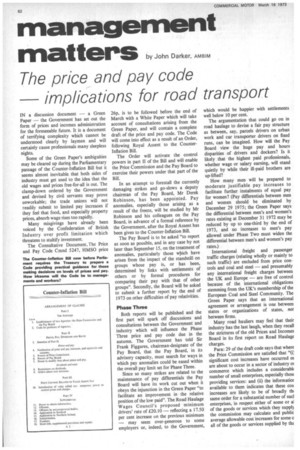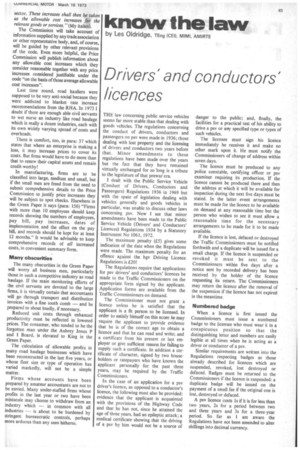management
Page 64

Page 65

If you've noticed an error in this article please click here to report it so we can fix it.
matters by John Darker, AM RIM
The price and pay code implications for road transport
IN a discussion document — a Green Paper — the Government has set out the form of prices and incomes administration for the foreseeable future. It is a document of terrifying complexity which cannot be understood clearly by laymen and will certainly cause professionals many sleepless nights.
Some of the Green Paper's ambiguities may be cleared up during the Parliamentary passage of the Counter-Inflation Bill but it seems almost inevitable that both sides of industry must get used to the idea that the old wages and prices free-for-all is out. The clamp-down ordered by the Government and devised by civil servants may prove unworkable; the trade unions will not readily submit to limited pay increases if they feel that food, and especially property prices, absorb wage rises too rapidly.
Many misgivings have already been voiced by the Confederation of British. Industry over profit limitation which threatens to stultify investment.
The Consultative Document, The Price and Pay Code Cmnd 5247, HMSO price 26p, is to be followed before the end of March with a White Paper which will take account of consultations arising from the Green Paper, and will contain a complete draft of the price and pay code. The Code will come into effect as a result of an Order, following Royal Assent to the CounterInflation Bill.
The Order will activate the control powers in part II of the Bill and will enable the Price Commission and the Pay Board to exercise their powers under that part of the Bill.
In an attempt to forestall the currently damaging strikes and go-slows a deputy chairman of the Pay Board, Mr Derek Robinson, has been appointed. Pay anomalies, especially those arising as a result of the freeze, will be studied by Mr Robinson and his colleagues on the Pay Board, in advance of a formal reference by the Government, after the Royal Assent has been given to the Counter-Inflation Bill.
The Pay Board is to be asked "to report as soon as possible, and in any case by not later than September 15, on the treatment of anomalies, particularly those which have arisen from the impact of the standstill on groups whose pay is, or has been, determined by links with settlements of others or by formal procedures for comparing their pay with that of other groups". Secondly, the Board will be asked to submit a further report by the end of 1973 on other difficulties of pay relativities.
Phase Three
Both reports will be published and the first part will spark off discussions and consultations between the Government and industry which will influence the Phase Three price and pay code due in the autumn. The Government has told Sir Frank Figgures, chairman-designate of the Pay Board, that the Pay Board, in its advisory capacity, must search for ways in which pay anomalies could be eased within the overall pay limit set for Phase Three.
Since so many strikes are related to the maintenance of pay differentials the Pay Board will have its work cut out when it obeys the injunction in the Green Paper "to facilitate an improvement in the relative position of the low paid". The Road Haulage Wages Council's proposed minimum drivers' rate of £20.10 — reflecting a 17.50 per cent increase on the previous minimum — may seem over-generous to some employers or, indeed, to the Government, which would be happier with settlements well below 10 per cent.
The argumentation that could go on in road haulage to devise a fair pay structure as between, say, parcels drivers on urban work and car transporter drivers on fixed runs, can be imagined. How will the Pay Board view the huge pay and hours disparities of drivers and dockers? Is it likely that the highest paid professionals, whether wage or salary earning, will stand quietly by while their ill-paid brothers are up-lifted?
How many men will be prepared to moderate justifiable pay increases to facilitate further instalments of equal pay for women? (Pay differentials between men and women should be eliminated by December 29 1975; the Green Paper says the differential between men's and women's rates existing at December 31 1972 may be reduced by up to one-third by the end of 1973, and no increases to men's pay allowed under Phase Two must widen the differential between men's and women's pay rates.)
International freight and passenger traffic charges (relating wholly or mainly to such traffic) are excluded from price controls and coal and steel — and presumably any international freight charges between the UK and Europe — are free of control because of the international obligations stemming from the UK's membership of the European Coal and Steel Community. The Green Paper says that an international agreement or arrangement is one between states or organizations of states, not between firms.
Many road hauliers may feel that their industry has the last laugh, when they recall the strictures of the old Prices and Incomes Board in its first report on Road Haulage charges.
Para: 29 of the draft code says that where the Price Commission are satisfied that "(i) significant cost increases have occurred cm are about to occur in a sector of industry 01 commerce which includes a considerabh number of small enterprises, especially thost providing services: and (ii) the informatior
available to them indicates that these cos increases are likely to be of broadly tip same order for a substantial number of suei enterprises, in respect either of some or al of the goods or services which they supply the commission may calculate and publis' average allowable cost increases for some all of the goods or services supplied by thE
sector. These increases shall then be taken as the 'allowable cost increases for the relevant goods or services." (My italics).
The Commission will take account of information supplied by any trade association or other representative body, and, of course, will be guided by other relevant provisions of the code. Even more helpful, the Price Commission will publish information about any allowable cost increases which they consider reasonable together with any price increases considered justifiable under the code "on the basis of those average allowable cost increases".
Last time round, road hauliers were supposed to be very anti-social because they were addicted to blanket rate increase recommendations from the RHA. In 1973 I doubt if there are enough able civil servants to wet nurse an industry like road haulage which is really a dozen industries, each with its own widely varying spread of costs and overheads.
There is comfort, too, in para: 37 which states that where an enterprise is making a loss, it may increase prices to cover its costs. But firms would have to do more than that to renew their capital assets and remain credit-worthy!
In manufacturing, firms are to be classified into large, medium and small, but if the small men are freed from the need to submit comprehensive details to the Price Commission to justify price increases they will be subject to spot checks. Elsewhere in the Green Paper it says (para: 156) "Firms with more than 10 employees should keep records showing the numbers of employees, pay bill, pay increases, dates of implementation and the effect on the pay bill, and records should be kept for at least 12 months." It would be advisable to keep comprehensive records of all increased costs, in convenient summary form.
Many obscurities
The many obscurities in the Green Paper will worry all business men, particularly those in such a competitive industry-as road haulage. If the main monitoring efforts of the civil servants are devoted to the large firms, it is virtually certain that accountants will go through transport and distribution invoices with a fine tooth comb — and be prepared to shout loudly, if necessary.
Reduced unit costs through enhanced productivity must be reflected in lowered prices. The consumer, who tended to be the forgotten man under the Aubrey Jones P and I Board, is elevated to King in the Green Paper.
The calculation of allowable profits in many road haulage businesses which have been reconstructed in the last five years, or whose fleet size or type of operation has varied markedly, will not be a simple matter.
Firms whose accounts have been prepared by amateur accountants are not to be envied. Many under-staffed firms whose profits in the last year or two have been miniscule may choose to withdraw from an industry which — in common with all industries — is about to be burdened by stringent bureaucratic controls, perhaps more arduous than any seen hitherto.
























































































































